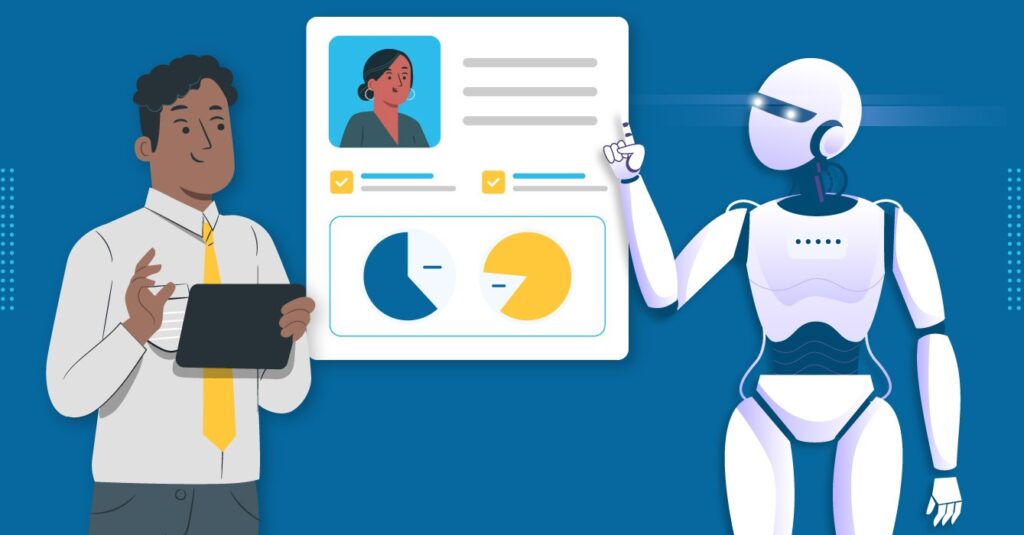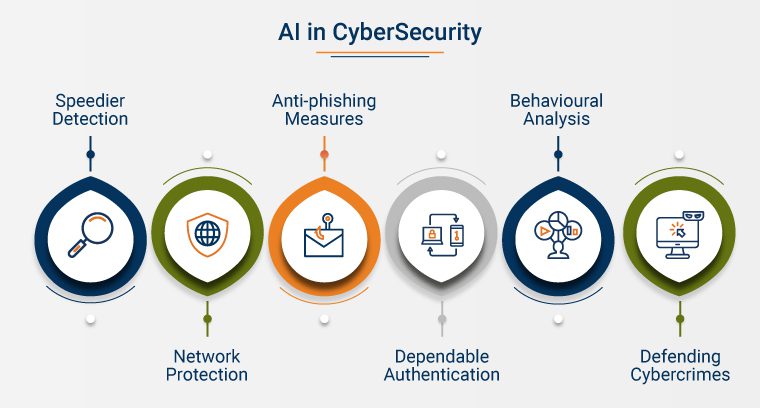Table of Contents
Artificial intelligence (AI) is sweeping the business world, and companies are developing new applications for AI in finance.
What is AI?
If you’re like a lot of investors, you probably have a general idea of what AI is but are having trouble putting it into words.
Artificial intelligence means that computers and other machines can do things that normally require human intelligence, like telling what kind of plant a picture of it is.
The application of machine learning and AI in finance services is not new. For some time now, payment companies have used machine learning to detect and prevent fraudulent transactions. As computing power and storage have increased, detection has become more real-time.
Cost savings from the use of AI in finance can be significant. Using AI in finance based tools, banks can increase the volume of interactions or transactions by 2-5X while maintaining the same headcount.
Continue reading to learn about 11 common examples of ai in finance, how financial firms use AI, ethical considerations, and what the future holds for this rapidly evolving industry.
1) Risk Assessment 🛡️
Thanks to AI’s strengths in data analysis, pattern recognition, and predictive modeling, risk assessment can be greatly improved. Several applications of AI in finance have the potential to enhance financial risk assessment, including the following:
- Data Analysis and Processing:
- AI in finance can swiftly and accurately process large volumes of financial data, such as market data, economic indicators, and previous financial performance.
- Natural Language Processing (NLP) allows AI in finance to evaluate unstructured data from news articles, social media, and other textual sources in order to extract sentiment and pertinent information.
- Predictive analytics:
- Machine Learning (ML) algorithms can recognize patterns and trends in historical data to forecast future market movements and financial performance.
- Predictive models can help determine the likelihood of default, market volatility, and other important risk indicators.
- Credit Score and Loan Approval:
- AI in finance powered credit scoring algorithms can more effectively assess an individual’s or business’s creditworthiness by taking into account a wider range of characteristics and real-time data.
- Automated loan approval systems can employ artificial intelligence (AI) to assess financial statements, cash flow data, and other relevant information, allowing for faster and more accurate lending decisions.
- Fraud detection:
- AI in finance systems can discover strange trends and anomalies in transactions, which could suggest fraudulent activity.
- Behavioral analytics and machine learning can continuously learn from fresh data and react to changing fraud tendencies.
- Portfolio Management:
- Artificial intelligence-powered portfolio management solutions can optimize investment portfolios depending on risk tolerance, market conditions, and individual objectives.
- Robo-advisors employ artificial intelligence (AI) to deliver tailored investing recommendations based on risk choices and market conditions.
- Market Risk Analysis:
- AI in finance models may analyze market risks by monitoring macroeconomic statistics, geopolitical events, and market sentiment, resulting in a more comprehensive picture of potential threats.
- Real-time monitoring of market conditions enables timely risk reduction solutions.
- Stress tests:
- AI in finance can simulate different economic scenarios and evaluate their impact on financial portfolios. Stress testing enables financial firms to determine how their portfolios will function under bad conditions.
- Compliance and Regulatory Reporting:
- AI can help to automate compliance operations by evaluating large volumes of regulatory data and ensuring that financial institutions follow the most recent norms and regulations.
- Automated reporting systems can assist in the accurate and timely submission of regulatory reports.
AI isn’t biased and can make a determination on loan eligibility quickly and more accurately.
2) Fraud detection and Prevention 🔎
When you’ve already made a lot of purchases, has your credit card company ever called you? AI in finance helps fraud detection systems look at a person’s buying habits and send an alert if they notice anything that doesn’t seem right or goes against their usual spending habits.
- Finding Abnormalities:
- Artificial intelligence systems can sift through mountains of transaction data in search of out-of-the-ordinary occurrences.
- Without using any predetermined rules, unsupervised machine learning models are able to identify anomalies.
- Analytics based on behavior:
- In order to build personalized profiles, AI systems study user actions across time.
- Warnings about possible fraudulent activity can be triggered when there is a departure from established behavioral patterns.
- Monitoring in Real-Time:
- AI allows for the monitoring of transactions in real-time, which helps to detect suspicious activities immediately.
- The prevention of fraudulent transactions is highly dependent on the speed of response.
- Identification of Patterns:
- When it comes to well-known fraud schemes, machine learning algorithms can spot patterns.
- Systems can adjust to new fraud patterns as they arise thanks to continuous learning.
- Modeling for Predictions:
- In order to foresee and prepare for possible fraud risks, AI models look at past data.
- Financial institutions can keep up with the ever-changing tactics of fraud with the help of predictive analytics.
- Verification through Biometrics:
- Another safeguard is the use of biometric authentication powered by AI, like fingerprint or face recognition.
- Unauthorized access and identity theft can be better prevented with this.
- Data Mining for Anti-Fraud Regulations:
- With the use of past data, AI can automatically create and improve fraud detection rules.
- Because of its flexibility, the system can adapt to new fraud patterns as they emerge.
- Analysis of Links:
- Artificial intelligence (AI) can decipher intricate fraud networks by analyzing relationships and connections between entities (such as accounts and users).
- Using link analysis, coordinated fraudulent activities can be more easily identified.
- Keeping an Eye on Sales:
- Artificial intelligence systems are always on the lookout for risky or suspicious patterns in financial data.
- The precision of monitoring is improved by methods driven by machine learning and rules.
- Decision-Making and Automated Alerts:
- Notifications of possible fraud can be generated in real-time by AI systems.
- Quick actions, like halting transactions or starting extra verification steps, are possible thanks to automated decision-making capabilities.
- Intelligence for Collaboration:
- With the help of AI, various financial institutions can more easily share information and work together to fight fraud.
- A more complete picture of possible dangers can be created through shared databases and insights.
3) Risk Management 🎯
AI in finance is like a super helper in the finance world, especially when it comes to managing risks. It can look at tons of financial information, predict what might happen in the market, and spot different kinds of risks early on. For example, AI in finance helps figure out if someone might not be able to repay a loan by analyzing their info. It also keeps an eye on transactions in real-time to catch any suspicious activity, like fraud.
Besides that, AI in finance helps with everyday operations by automating tasks and making sure everything follows the rules. It’s like having a smart assistant that helps make sure the money and information stay safe from cyber threats. AI also helps decide how to invest money wisely and tests how well things would go in different situations. Overall, AI is a valuable partner for finance folks, helping them understand and handle risks in a constantly changing financial world.
4) Credit Decisions 💳
By incorporating AI into the credit decision-making process, financial institutions can make more informed, faster, and fairer decisions. AI’s ability to analyze diverse data sources and adapt to evolving patterns contributes to a more accurate assessment of credit risk and enhances overall risk management in the lending process.
- AI algorithms analyze a wide range of data, including financial history, payment patterns, and other relevant factors, to generate more accurate and personalized credit scores.
- Machine learning models continuously learn from new data, adapting and refining credit scoring over time.
- AI allows the inclusion of non-traditional data sources, such as social media activity, utility payments, or rent history, to provide a more comprehensive picture of an individual’s creditworthiness.
- This helps in assessing the creditworthiness of individuals with limited or no traditional credit history.
- AI models use historical data to predict the likelihood of default or delinquency, allowing financial institutions to assess the potential risks associated with lending to a particular individual or business.
- AI can segment customers based on their credit risk profiles, allowing financial institutions to tailor their products and services to different risk categories effectively.
- AI in finance ensures that credit decisions comply with regulatory requirements by automating compliance checks and adapting to changes in regulations.
5) Financial Advisees 💹

People can get personalized financial advice that takes their specific needs and goals into account when AI is used in personal finance advice. AI is a useful tool for people who want to improve their financial well-being because it can automate routine financial tasks and change its advice based on new information.
- Budgeting and Spending Analysis:
- AI-powered tools in finance can analyze an individual’s spending habits, categorize expenses, and create personalized budgets.
- Insights into spending patterns help users identify areas for potential savings.
- Financial Goal Planning:
- AI can assist in setting and planning for financial goals by considering an individual’s income, expenses, and risk tolerance.
- Automated systems can recommend strategies to achieve short-term and long-term financial objectives.
- Debt Management:
- AI in finance can help users manage and reduce debt by analyzing interest rates, payment histories, and available funds.
- Personalized strategies may include debt repayment plans and consolidation options.
- Expense Tracking and Alerts:
- AI-powered apps can track daily expenses and provide real-time alerts when users approach or exceed their budget limits.
- Timely notifications help individuals stay on top of their financial commitments.
- Tax Optimization:
- AI can offer personalized tax strategies by analyzing income sources, deductions, and credits.
- Users receive advice on optimizing their tax position and potentially increasing their after-tax income.
- Behavioral Finance Insights:
- AI incorporates insights from behavioral finance to understand individual financial behaviors and preferences.
- This allows for more personalized and effective advice that aligns with the user’s financial psychology.
6) AI in Finance can enable 24/7 Customer Service 📲
Customers no longer have to wait in line to speak with a real person—they can ask questions whenever they want, day or night, thanks to chatbots and other forms of artificial intelligence.
An artificial intelligence chatbot or voice recognition system is likely to have assisted you in your most recent interaction with your bank.
Banking institutions compete for valuable customers, including high-net-worth individuals, and excellent customer service is a key differentiator.
When it comes to customer service, banks use AI for a lot of different things, like answering questions via chatbots and voice recognition apps.
- Personalized Customer Interactions:
- AI systems can use customer data to provide personalized interactions, addressing individuals by name and offering tailored recommendations.
- Personalization enhances the customer experience and builds a stronger connection.
- Predictive Customer Support:
- AI in finance analyzes historical customer interactions and data to predict potential issues or trends.
- Proactive support measures can be implemented to address concerns before customers even reach out.
- Chatbots and Virtual Assistants:
- AI-powered chatbots provide instant responses to customer queries on websites, apps, or messaging platforms.
- Virtual assistants handle routine tasks, answer frequently asked questions, and guide users through basic troubleshooting steps.
- Automated Email Responses:
- AI-driven systems can analyze and respond to customer emails, providing quick and relevant answers to common queries.
- This helps in managing email volumes and reducing response times.
- Voice Assistants and Interactive Voice Response (IVR):
- AI-powered voice assistants understand spoken language and assist customers over the phone.
- IVR systems guide customers through automated menus and help route calls efficiently.
- Self-Service Options:
- AI in finance enables the development of self-service portals and knowledge bases.
- Customers can find answers to common questions and troubleshoot issues independently, reducing the need for direct support.
- 24/7 Availability:
- AI-powered systems can provide round-the-clock customer support, ensuring assistance is available whenever customers need it.
Businesses that incorporate AI in finance into their customer support processes can increase efficiency, improve customer satisfaction, and streamline interactions, resulting in a more responsive and personalized service. AI’s ability to handle routine tasks frees up human agents to focus on more complex and valuable aspects of customer support.
7) Cyberattack Prevention 🛡️

Human mistake accounts for as much as 95% of cloud breaches, according to estimates. By analysing and identifying typical data patterns and trends, AI in finance can help businesses improve their security. It can then notify businesses of any discrepancies or unusual activity.
- Malware Detection and Prevention:
- AI scans files and network traffic in real-time to identify known and unknown malware.
- Behavioral analysis helps in recognizing malicious code patterns, enhancing malware detection capabilities.
- Adaptive Authentication:
- AI enables adaptive authentication systems that analyze user behavior to assess the risk level.
- Unusual behavior triggers additional authentication steps, preventing unauthorized access.
- Network Security:
- AI in finance monitors network traffic for unusual activities and can detect patterns indicative of cyber attacks.
- Intrusion detection and prevention systems use AI to identify and respond to threats in real-time.
- Incident Response:
- AI assists in incident response by analyzing data and providing insights into the scope and severity of a cyber attack.
- This speeds up the response time and helps in containing the impact of security incidents.
8) Regulations and Compliance 🗃️
A financial institution must follow a variety of laws and regulations, which can be difficult to keep track of. Reports take too long, and a single detail overlooked by a bank specialist can result in minor complications or even serious issues. AI in finance considers all regulations, detects deviations, analyses data, and follows the rules precisely. AI can help you avoid problems by completely automating your processes.
9) Portfolio management 👨💻
AI in finance portfolio management is having a significant influence on the financial industry, signifying a transition away from conventional, human-centric methodologies and towards a more data-driven approach. AI has transcended the buzzword status to become an essential component in portfolio management. It solves the issues of quick market swings that traditional systems, which are generally sluggish and expensive, cannot match. Investors, who frequently deal with massive volumes of data and the requirement for emotion-free decision-making, benefit from AI’s capacity to process and analyse both structured and unstructured financial data at unprecedented rates.
AI’s powerful algorithms not only handle this data, but also extract important insights from it, seeing patterns and forecasting future market behaviours with greater accuracy than ever before. AI’s predictive ability helps investors make well-informed, data-driven decisions, lowering risks and improving portfolio performance.
Additionally, AI in finance powered portfolio management solutions provide the benefit of dynamic, real-time market analysis. They respond quickly to market movements, offering timely insights and suggestions and allowing investors to alter their strategy accordingly. This adaptability is especially important in stormy markets, where it may drastically reduce losses while increasing profits.
10) Anti-Money Laundering 💸

There are several advantages of using AI in AML efforts.
- Enhanced accuracy: AI systems can analyse massive volumes of data in real time and spot patterns that people may miss. This improves financial institutions’ ability to spot suspicious transactions and behaviours while reducing false positives.
- Enhanced efficiency: AI can free up resources for other crucial duties by automating many of the manual AML tasks, like transaction monitoring and customer due diligence. Additionally, by cutting down on the time needed for compliance reviews, financial institutions are able to react to possible threats more quickly.
- Continuous learning: Financial institutions can remain ahead of new risks and dangers thanks to AI’s ability to continuously learn and adapt to new patterns and trends.
- Cost-effective: Financial institutions can cut expenses related to compliance checks and investigations by automating a large number of AML procedures.
11) Continuous learning and adaptation 🪴
In the data science world, continuous learning is a method in which a machine-learning model keeps developing and improving over time as it is exposed to new data. This is similar to the way in which we humans have learned skills and attained (or discarded) knowledge over the centuries.
A model can produce predictions and suggestions that are more accurate the more data it is exposed to because it gains a deeper understanding of the underlying patterns and relationships.
How does this function? Predictions that are more precise and customised lead to better decision-making, higher sales, and happier customers. In fact, concentrating on personalisation strategies can increase income for businesses by 40%.
Continuous learning is employed in use cases by companies like these:
- Netflix: A continuous-learning training pipeline is used each time you choose a film or television show to watch. Netflix is able to “intuitively” recommend episodes and films you might enjoy by continuously feeding its recommendation systems information about your past viewing choices, interests, and background. The program keeps an eye on your interactions and responses, which is why it might suggest the newest true-crime movie or romantic comedy.
- Amazon: Because of the website’s recommendation engine, every purchase you make on Amazon contributes to your ongoing education. Your browsing history, previous purchases, and the items in your shopping basket directly influence the creation of your “Frequently bought together” and other recommendations. The recommendation algorithm is able to create an almost exact image of what else you could want thanks to all of your interactions.
- YouTube: As you interact with various videos, the system is updated. With its recommendation engine, Continuous Learning makes suggestions for Big Think and other channels based on your viewing preferences, likes, and dislikes.
An example table of AI in finance applications provided below:
| AI Applications in Financial Services | Description |
|---|---|
| Automated Trading | AI-powered algorithms execute high-frequency trades by analyzing market data and historical trends. |
| Fraud Prevention | Cognitive Computing detects suspicious patterns in transaction data. This helps detect and prevent fraud. |
| Credit Risk Assessment | Machine learning models evaluate creditworthiness using diverse data inputs. |
| Virtual Customer Support | AI-driven chatbots and virtual assistants provide round-the-clock customer assistance. |
| Robotic Economic Advisers | Automated investment platforms utilize AI to construct and manage customized portfolios. |
| Risk Analysis and Prediction | Machine Intelligence algorithms assess and predict economic risks. |
| Sentiment Analysis | Natural Language Processing (NLP) interprets news, social media, and sentiment data to gauge market sentiment. |
| Tailored Marketing Campaigns | MI scrutinizes customer data to create precisely targeted marketing strategies. |
| AI-Enhanced Banking Chatbots | Conversational MI chatbots assist customers with account queries, transactions, and financial advice. |
| Regulatory Compliance Automation | AI in finance streamlines compliance checks and reporting, aiding economic institutions in adhering to regulations. |
| Market Trend Forecasting | MI models predict market trends, stock prices, and economic indicators. |
| Optimized Portfolio Management | AI in finance aids portfolio managers in optimizing asset allocations and adapting portfolios to changing market conditions. |
| Voice Authentication | MI-driven voice recognition systems bolster security for telephone banking. |
| Automated Loan Underwriting | AI automates loan application processes by analyzing applicant data and credit risk metrics. |
| Blockchain Transaction Monitoring | MI monitors blockchain transactions to detect fraud and ensure compliance within cryptocurrency. |
| Cybersecurity Enhancement | AI in finance identifies and responds to cybersecurity threats by analyzing network traffic. |
Let’s take a closer look at examples of AI in finance services.
- AlphaGo by DeepMind: Financial professionals use AlphaGo technology for algorithmic trading. Hedge funds use similar AI in finance based algorithms to make real-time trading decisions.
- Credit Karma: Credit Karma uses AI in finance algorithms. It provides users with free credit scores and personalized recommendations. The app does this based on their credit history.
- IBM Watson: IBM Watson supports virtual assistants and chatbots. Various economic institutions use them to provide customer support and respond to inquiries.
- Wealthfront and Betterment: These are popular robo-advisory platforms. They use ai in finance to create and manage investment portfolios for users.
- ZestFinance: ZestFinance uses machine learning to underwrite loans and assess credit risk for lenders.
- Metromile: Metromile uses telematics and artificial intelligence to offer pay-per-mile auto insurance. It adjusts premiums based on driver behavior.
- VoicePIN: It is one example of AI in financial services. It offers voice biometric solutions. Economic institutions use them to authenticate customers over the phone.
- N26 and Chime: Such mobile banks use technology based on artificial intelligence. It helps provide users with real-time spending information, automated savings features, and more.
- Robinhood and E*TRADE: These online brokerage platforms use artificial intelligence to give users real-time market data.
These illustrations show several applications and use cases for AI in finance. With the advancement of innovation, its application in economic services keeps growing and changing.
Conclusion 🎯
It would be foolish to ignore the advanced innovation that is digitisation when it comes to making money. It has been discovered that machine intelligence can be advantageous to financial institutions, banks, and other businesses. AI in finance enables time-saving and productivity-boosting techniques. Routine tasks are generally completed by intelligence. Additionally, people can focus on more important duties. Investment risks can be calculated or other computations can be assisted by digital intelligence. These algorithms are typically seen in online banking as well. Utilising these cutting-edge technology has numerous benefits, as we have already covered. In conclusion, there are many applications of AI in finance.
FAQ 💡
How is AI used for fraud detection in finance?
AI analyzes transaction patterns in real-time to identify anomalies and flag potential fraudulent activities, enhancing security and reducing financial losses.
What role does AI play in personalized banking?
AI leverages customer data to offer tailored financial advice, product recommendations, and personalized experiences, improving customer satisfaction and engagement.
Can AI improve risk management in finance?
Yes, AI uses predictive analytics and machine learning to assess risks, forecast market trends, and optimize decision-making for better financial outcomes.
How does AI streamline loan approval processes?
AI automates credit scoring and loan underwriting by analyzing applicant data, reducing processing time, and improving accuracy in lending decisions.
What are the benefits of AI in investment management?
AI-powered robo-advisors provide data-driven investment strategies, portfolio management, and market insights, making wealth management more accessible and efficient.
References
- https://www.weforum.org/agenda/2021/06/ai-fraud-detection-financial-services/
- https://hbr.org/2020/11/how-ai-is-changing-investment-management
- https://www.forbes.com/sites/forbestechcouncil/2021/09/15/10-ways-ai-is-transforming-the-finance-industry/
- https://www2.deloitte.com/us/en/insights/industry/financial-services/artificial-intelligence-in-risk-management.html


